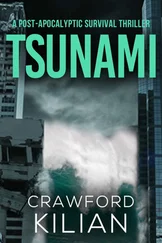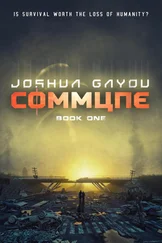“Oscar, I’d like you to start working on some ideas for that; your background in the construction industry will give you some unique insight into the problem. That alright with you?”
“Uh, sure, man,” I said, wondering how the hell I was going to house sixteen people without a work crew. “No sweat, I guess.”
“Keep in mind,” Gibs offered, “that you don’t have to worry about inspectors, osha, or any of… of that. What we come up with needs to be safe to live in but it doesn’t need to be a palace. One of the first things we could do is board up the windows on the bus, rip out all the seating, and build in a bed, some living area, maybe throw in a camping stove. See what I mean?”
“Yeah,” I said, nodding. “Yeah, that’s a good point, man.” I looked back at Jake, a little excited, and said, “Okay, bro, lemme work on this a bit. I think I got a few ideas that’ll do.”
“Thank you, Oscar, that’s much appreciated,” said Jake. “Next item: sanitation. As some of you may realize, the cabin sits on a septic system. I’m not sure exactly how old the cabin is but let’s guess and call it five years, for much of which it sat idle; our friend Billy used it as a summer getaway. The average septic system lasts about forty years, so given the lack of use this place saw, we’ll assume a total of forty years of good, future use. Now, this average of forty years is based on your typical American family unit; call it four people. That’s forty years for four people. Another way to look at it would be to say that the system would last for one hundred sixty years if used by only one person, right? One hundred sixty divided by four people puts you at forty years, basically.”
People were nodding while Amanda was writing these numbers out on the board. I already knew where this was going.
“So, if we follow that math, we can extrapolate and say that the same septic system only lasts about eight and a half years when used consistently by nineteen people. One hundred sixty divided by nineteen is around eight and a half, see? There’s a decent chance we’re going to be here longer than that, so a single septic system divided among us all isn’t going to cut it. On top of that, you need water to drive normal toilets, and we don’t want to use as much water as it will take to flush for nearly twenty people.”
Gibs was nodding while shifting around from foot to foot and waved at Jake. Jake raised his eyebrows and nodded back, letting him know he should speak.
“I can take this one on if you like. I have some experience in this area.”
“What do you recommend?” Jake asked.
“Well, in the absence of chemical toilets, the obvious choice is a pit latrine. Basically, you dig a six-foot pit, put a cover on top of it with a little hole cut out, and then build up an outhouse around that. We could dig his and hers pits.”
“Drawbacks?” Amanda asked from behind Jake.
“A few,” said Gibs. “First, you wouldn’t want to do this if you’re sitting on a high water table… does anyone know if we are?”
“I think we’re okay, there,” Jake said. “Our well is sunk fairly deep.”
“Alright, good to go. Other problems include the obvious smell and the fact that contaminants from the waste material will leach into the nearby soil, so we have to keep this well removed from the main living area and any farmland we plan on cultivating. Can I get at that whiteboard?”
“Absolutely,” Jake said, and Amanda handed over the marker as Gibs approached. Gibs started by drawing out a wobbly circle with a break in the line at the bottom right corner. At the top left corner, he drew two rectangles.
“Okay, so this is the valley, and these two boxes up here are the cabin and garage, right? This break down here is the entrance into our valley,” said Gibs while pointing at the board. “Off to the northeast of the garage is the well. What do you call it, Jake? Thirty yards?”
“Sure, close enough,” Jake agreed.
“Good. Some distance up from there in the same direction is the river, right? I haven’t seen it yet; does it always have water?”
“It’s more of a stream, really. It runs out the cleft alongside the road,” said Jake. “I’m pretty sure it’s all fed by snowmelt. It’s more or less a mud patch right now. I haven’t seen how heavy it gets when the season is right.”
“Okay, probably doesn’t matter either way. I’m gonna say we put the pit latrines down here.” He drew a couple of X’s along the edge of the circle southwest of the house. “We’ll say a hundred yards out from the house; that’s a total minimum distance of a hundred and thirty yards out from any main water source. Additionally, let’s say we maintain a minimum distance of one hundred yards between this location and any crops we eventually grow. That should keep our food and water supply safe. So that’s another disadvantage; you’ll have to go for a walk any time you want to deuce.”
Gibs handed the marker back to Amanda and resumed his place among the group. He said, “Finally, these things will fill up. When the fill level of the pit comes to within a foot of the cover, we’ll need to fill in the hole with dirt, tamp it down, and move the whole setup to another location; relatively close but not close enough that the new pit breaks into the old one.”
“How long would it take to fill one of these things up?” asked Barbara with a sour expression.
“Can’t say for sure,” Gibs said. “I don’t have a lot of experience with these. Mostly, we were either in small groups straddling trenches or in groups large enough that we needed burn out latrines.”
“Burn… out?” Barbara asked.
“Yeah. In our case out here, you’d basically build up an outhouse-like enclosure around some metal drums. You cut the drums in half, so you get two units per drum. People squat into that and, once per day, you pull them out, add in some diesel or morgas, and burn the contents. It’s typically a no-no to do unless you’re in some third world sh—uh—an underdeveloped nation. Environmental regulations, see? Not exactly a problem anymore.”
“So, they’d need fuel,” Jake said. “Good to note.”
“Not in our case,” Gibs said. “It’s too valuable, but there are other options. There’s a lot of water in crap, so letting it dry out enough to be combustible isn’t the best option. We could get the fire going by burning our garbage over it, which would theoretically burn off the initial moisture—”
“I think this might be the most disgusting conversation I’ve ever heard,” Rebecca said.
“—or we could look at making charcoal from the local wood supply, which wouldn’t be difficult. I haven’t tried this before personally, but I think it would be possible to build a, uh, a poop barbecue. It would take a lot longer to completely burn the material out but if you expose it to extreme heat for long enough, all the water cooks off, and then the waste itself eventually converts to ash. Charcoal burns really hot for a long time, so… you know. But all that’s for when you have a lot of people; say a hundred or more. I think the pits are good enough for now.”
“So that covers number two,” said Monica. “What about number one? I’m assuming we’re good to do everything in the pits, aren’t we?”
“You know, we can make some pretty powerful fertilizer with the urine,” Barbara said.
Everyone stopped and looked at her, this little, old lady with short, mom-hair. “Why, Barbara,” Gibs said, smiling, “what have you been up to?”
“I loved to garden,” she said, sounding defensive. “I liked reading about this stuff. Anyway, we can let it ripen up a bit and mix it into compost. It’s like fertilizer steroids.”
Читать дальше












